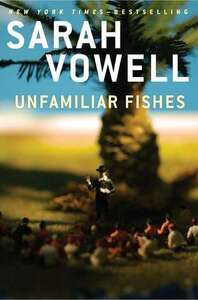Take a photo of a barcode or cover
The day Unfamiliar Fishes came out, it was downloaded to my Kindle. I loved Sarah Vowell's previous books, especially Assassination Vacation. Sarah Vowell has turned into a sort of deep sticky underbelly of American History sort of historian whose books feel like long episodes of The American Life (and I love This American Life). I foist them on everyone I see -- "Want to learn bizarre facts of American History? Read these books!"
I liked Unfamiliar Fishes, a book on the history of Hawai'i from 1778-1900, but the subject matter is so soul-crushingly depressing the upbeat sarcastic tone of the text clashed with the actual text at times. The narrative begins with the death of Captain Cook in 1778 at the then-named "Sandwich Islands" for doing horrible things to the local natives and then discusses what Hawai'i was like at that time: not a peaceful paradise. The islands had just been forged into a Kingdom after a bloody civil war. The society was highly stratified with bloodlines of chiefs and a feudalistic system of land division. Men and women were segregated from one another at meal times and women were forbidden to eat certain foods under kapu laws. They had their own Gods -- Ku the War God gets prominent mention for his prominent temple. Then the missionaries came with their Jesus and their Bibles in 1820 and everything changed.
Everything would have changed anyway. Had it not been the missionaries it would have been someone else. The missionaries at least came with the printing press and a zeal for learning. They translated the Bible into a new written form of Hawai'ian and, from there, others wrote down all the chants and religion and myths and culture they could to preserve it. The missionaries came to save the Hawai'ians, which meant stamping out the local culture, shoving New England Protestantism on it, and persuading the high Chiefs to do away with various bits of their culture to make it more "modern." Granted, by the time the missionaries came, the Hawai'ians were starting to dismantle some of their culture anyway, so perhaps some of it is moot, but it would have taken a different course.
Then the shipping came, and then the sugar plantations, and the imported workers, and the round trips from newly established and totally hot San Francisco, and then with it came the smallpox and the malaria and the dysentery and everything else that could wipe out a local population. In time, the US Navy started eying Hawai'i as a Pacific port, especially with the sexy Pearl Harbor. Enterprising grandchildren of the original missionaries decided to stage a coup, and then decided to get Hawai'i annexed to the US to avoid tariffs on sugar. When Congress voted against the treaty of annexation due to the protest of the islanders, Pres. William McKinley decided it was good old "American Manifest Destiny" and figured out a back door to get annexation through anyway.
The sugar plantations are gone, now. And there's a huge revival of local culture -- a good thing.
Why did I give this book 3 stars? Mostly because Goodreads won't allow me to set 3.5. This is a good book, but not a great book. It does feel like a long episode of This American Life, but not one that sticks in the memory. I also felt terrible and depressed at the end because it's a terrible and depressing subject, and no amount of sarcasm and no number of funny stories about insane Mormons who are trying to become King of the Pacific make up for how sad and depressing the story is. It reminded me strongly of George Carlin's bit, "Religious Lift." It goes like this:
"Like I say, religion is a lift in your shoe, man. If you need it, cool. Just don't let me wear your shoes if I don't want 'em and we don't have to go down and nail lifts onto the native's feet!"
I liked Unfamiliar Fishes, a book on the history of Hawai'i from 1778-1900, but the subject matter is so soul-crushingly depressing the upbeat sarcastic tone of the text clashed with the actual text at times. The narrative begins with the death of Captain Cook in 1778 at the then-named "Sandwich Islands" for doing horrible things to the local natives and then discusses what Hawai'i was like at that time: not a peaceful paradise. The islands had just been forged into a Kingdom after a bloody civil war. The society was highly stratified with bloodlines of chiefs and a feudalistic system of land division. Men and women were segregated from one another at meal times and women were forbidden to eat certain foods under kapu laws. They had their own Gods -- Ku the War God gets prominent mention for his prominent temple. Then the missionaries came with their Jesus and their Bibles in 1820 and everything changed.
Everything would have changed anyway. Had it not been the missionaries it would have been someone else. The missionaries at least came with the printing press and a zeal for learning. They translated the Bible into a new written form of Hawai'ian and, from there, others wrote down all the chants and religion and myths and culture they could to preserve it. The missionaries came to save the Hawai'ians, which meant stamping out the local culture, shoving New England Protestantism on it, and persuading the high Chiefs to do away with various bits of their culture to make it more "modern." Granted, by the time the missionaries came, the Hawai'ians were starting to dismantle some of their culture anyway, so perhaps some of it is moot, but it would have taken a different course.
Then the shipping came, and then the sugar plantations, and the imported workers, and the round trips from newly established and totally hot San Francisco, and then with it came the smallpox and the malaria and the dysentery and everything else that could wipe out a local population. In time, the US Navy started eying Hawai'i as a Pacific port, especially with the sexy Pearl Harbor. Enterprising grandchildren of the original missionaries decided to stage a coup, and then decided to get Hawai'i annexed to the US to avoid tariffs on sugar. When Congress voted against the treaty of annexation due to the protest of the islanders, Pres. William McKinley decided it was good old "American Manifest Destiny" and figured out a back door to get annexation through anyway.
The sugar plantations are gone, now. And there's a huge revival of local culture -- a good thing.
Why did I give this book 3 stars? Mostly because Goodreads won't allow me to set 3.5. This is a good book, but not a great book. It does feel like a long episode of This American Life, but not one that sticks in the memory. I also felt terrible and depressed at the end because it's a terrible and depressing subject, and no amount of sarcasm and no number of funny stories about insane Mormons who are trying to become King of the Pacific make up for how sad and depressing the story is. It reminded me strongly of George Carlin's bit, "Religious Lift." It goes like this:
"Like I say, religion is a lift in your shoe, man. If you need it, cool. Just don't let me wear your shoes if I don't want 'em and we don't have to go down and nail lifts onto the native's feet!"
I give this one 3.5-4 stars. It is not as good as some of her other books, but it is an engaging history of Hawaii nonetheless. Had no idea the extent of America's colonial wreckage there. Wow.
I chose to read this after honeymooning in Hawaii and glimpsing the native culture, as well as a barely perceptible undercurrent of malice toward the islands' many "haole" tourists. I have a much better understanding of both having read this, and wish I read it before my trip there.
For the record, I don't read much non-fiction, and find history to be an incredibly dry and boring subject, so this three-star rating is a rather complimentary one, considering the reader. Especially if you consider that the history of the annexation of Hawaii starts off with a pilgrimage of New England missionaries and ends decades later in a bloodless, legal coup (can you think of a more boring premise to base a book on?).
The title of the novel comes from Hawaiian writer David Malo, with this unfortunately prophetic quote:
For the record, I don't read much non-fiction, and find history to be an incredibly dry and boring subject, so this three-star rating is a rather complimentary one, considering the reader. Especially if you consider that the history of the annexation of Hawaii starts off with a pilgrimage of New England missionaries and ends decades later in a bloodless, legal coup (can you think of a more boring premise to base a book on?).
The title of the novel comes from Hawaiian writer David Malo, with this unfortunately prophetic quote:
If a big wave comes in, large and unfamiliar fishes will come from the dark ocean, and when they see the small fishes of the shallows they will eat them up. The white man's ships have arrived with clever men from the big countries. They know our people are few in number and our country is small, they will devour us.This book, sadly, made me a bit embarrassed to be an American. America's policy of manifest destiny at the cost of the cultures, freedoms and lives of various indigenous peoples throughout history is truly appalling, and this book -- although funny in its author's casual delivery -- is a sad reminder of one of the less publicized examples of that policy.
funny
informative
reflective
medium-paced
I know so much more about Hawaii than I ever thought I thought I might.
Vowell is just great.
She has a peculiar, serious yet lightly comical, take on history, and how it creates & effects our present.
The timeline felt a bit jumpy at points but all in all it was a good read.
Vowell is just great.
She has a peculiar, serious yet lightly comical, take on history, and how it creates & effects our present.
The timeline felt a bit jumpy at points but all in all it was a good read.
Sarah Vowell is one of my faves and this is another great addition to her collection. I didn't think I'd be particularly interested in Hawaii's history, but the writing style is engaging and funny.
I like Sarah Vowell, but I'm getting a bit tired of the religious pilgrim focus. I much preferred her take on American history that included so much more of her participation and discussion, rather than analysis of the facts at hand. But that being said, this book is very much a version of American history that I can't claim to have ever heard before. And you can't deny it's well-written and researched, even if it wasn't my cup of tea. When I finally get to travel to Hawaii, I'll pack this as my tour guide.
I love Sarah Vowell's writing enough to ignore the fact that I don't actually remember anything I learned while reading this book.
funny
informative
medium-paced
Either I'm over Sarah Vowell, or this just was no where near as good as her other books that I've read. It was hard to keep track of the narrative, and I don't really remember much about it at all (writing this review a year later)






